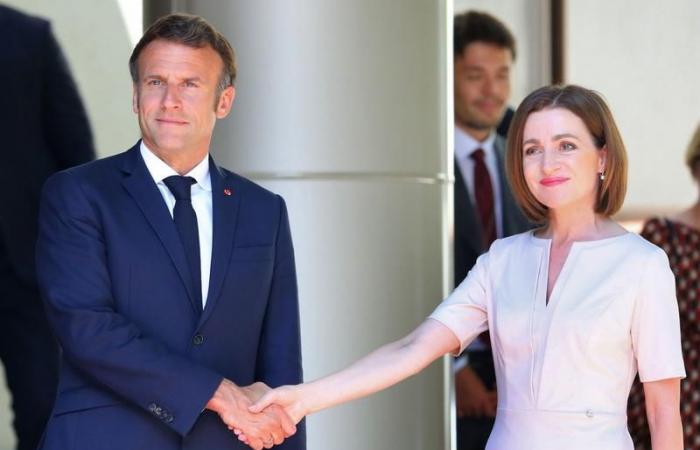
European leaders, from Emmanuel Macron to Ursula von der Leyen, rushed to congratulate Maia Sandu after her victory in the presidential final against Alexandr Stoianoglo. During this time, The Guardian newspaper observed that the result in the Republic of Moldova represents a blow to Russia and a consolidation of the country’s European path.
Several officials from the European Union greeted with obvious joy Maia Sandu’s victory in the second round of the presidential elections, which came at a time of conflict between the EU and Russia, with eastern states such as the Republic of Moldova or Georgia at the center the scene.
French President Emmanuel Macron congratulated Sandu on Sunday evening for his “re-election as head of the Republic of Moldova”, saying he was delighted that “democracy” had “triumphed over all interference and maneuvers”.
In a message posted on X in Romanian, Macron assured that “France will continue to be with Moldova on its European path”.
And the president of the European Commission, Ursula von der Leyen, congratulated Sandu on Sunday, declaring herself “happy to continue working” with her for a “European future” of the country.
This referred to the huge problems invoked by Chisinau with the frauds and interferences of Russia in the electoral process.
“It takes a rare kind of strength to overcome the challenges you faced in this election. I am happy to continue working with you for a European future for Moldova and its people,” wrote Ursula von der Leyen on X.
While Macron and von der Leyen did not mention Russia, Polish Prime Minister Donald Tusk had no problem doing so explicitly.
“Despite Russia’s aggressive and massive interference in the presidential elections in Moldova, Maia Sandu most likely defeated Moscow’s favorite. Let’s hope that this trend will continue in the coming days and months in other countries as well”, wrote Tusk on X, with one of the first reactions from Europe on the subject of the vote in the Republic of Moldova.
The struggle for influence between the EU and Russia
The tense votes in Georgia and the Republic of Moldova were closely followed in Europe, Russia, the USA and beyond, being considered as battlegrounds in the ever-expanding conflict between Moscow and the West, amid the war in Ukraine.
If the pro-Europeans lost the match in Georgia, as President Volodymyr Zelenski observed with frustration after last Saturday’s highly suspected vote of fraud, the Republic of Moldova proved resilient.
Two weeks ago, Politico warned, however, that the close score of the referendum for the European integration of Moldova demonstrated the limits of the EU in the struggle for influence with Putin’s Russia.
The fight will continue in view of next year’s parliamentary elections, which will be even more important than the presidential ones.
Andrei Curararu, from the WatchDog think tank, pointed out to AFP that Moldova is “the first target of Russia’s hybrid war”.
“Despite everything, Moldova has twice demonstrated that its desire to join the EU is stronger than Moscow’s pressure”, he added, stressing that “to stay on this path, the country will need help”. in view of the crucial parliamentary elections in the summer of 2025.
A blow for Moscow
The European press was also keeping an eye on the election in the Republic of Moldova, which has become a global event in recent weeks.
On Sunday, The Guardian wrote that Maia Sandu’s victory marks a significant boost for the country’s European aspirations and a clear blow to Moscow.
The British daily noted that Sandu’s position had been weakened following the referendum on EU integration, which was voted by a very narrow margin on 20 October.
Both rounds of the presidential election, as well as the EU referendum vote, were marred by allegations of Russian interference, the newspaper pointed out.
For months, Sandu and his allies have accused Russia and its proxies of running a large-scale campaign involving vote-buying and disinformation to influence the election.
The Kremlin has denied interference in the vote.
A choice between Europe and Russia
The BBC also wrote about Maia Sandu’s victory, which noted that the presidential election was seen as a choice between Europe and Russia.
The BBC quoted presidential national security adviser Stanislav Secrieru as saying that Russia organized buses and chartered flights to bring voters to polling stations.
Bomb alerts briefly disrupted voting in Moldova, at UK polling stations in Liverpool and Northampton, and in Frankfurt and Kaiserslautern in Germany, he added.
Reuters also noted Maia Sandu’s victory, while noting the conciliatory tone adopted by the president in her victory speech.
Sandu, writes Reuters, said the government must prepare the country for parliamentary elections next summer and defend democracy.
In a conciliatory speech, she stated that she heard the voices of both those who voted for her and those who voted for his rival, Alexandr Stoianoglo. She said her main goal for the coming years will be to be a president for everyone, Reuters also writes.





